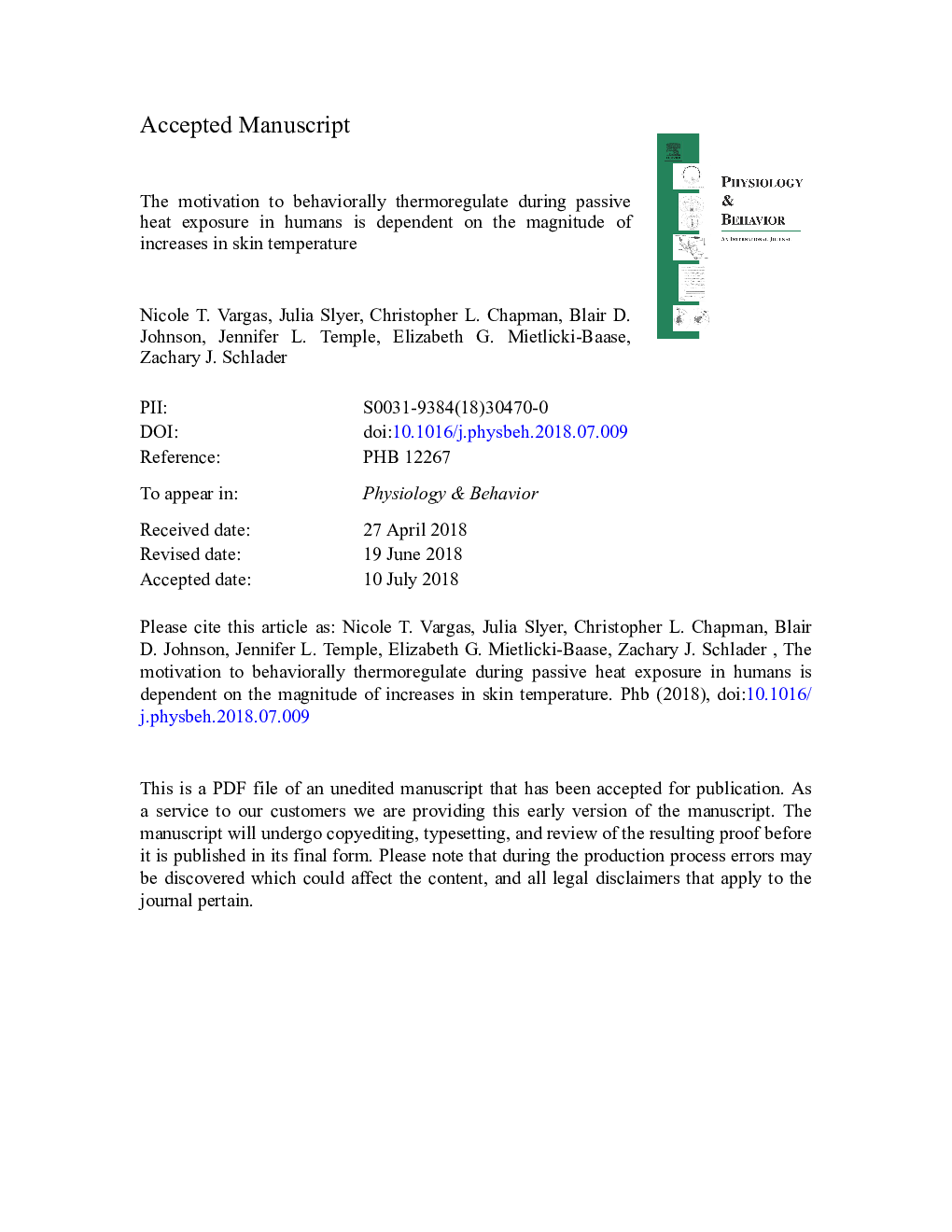| کد مقاله | کد نشریه | سال انتشار | مقاله انگلیسی | نسخه تمام متن |
|---|---|---|---|---|
| 8650345 | 1571124 | 2018 | 27 صفحه PDF | دانلود رایگان |
عنوان انگلیسی مقاله ISI
The motivation to behaviorally thermoregulate during passive heat exposure in humans is dependent on the magnitude of increases in skin temperature
ترجمه فارسی عنوان
انگیزه ای برای تغییر رفتار حرارتی در طی تابش گرم منفی در انسان بستگی به میزان افزایش دمای پوست دارد
دانلود مقاله + سفارش ترجمه
دانلود مقاله ISI انگلیسی
رایگان برای ایرانیان
کلمات کلیدی
رفتار حرارتی، اپراتور پاسخ تقویت حرارتی، تنظیم دما، دمای هسته،
موضوعات مرتبط
علوم زیستی و بیوفناوری
بیوشیمی، ژنتیک و زیست شناسی مولکولی
فیزیولوژی
چکیده انگلیسی
We tested the hypothesis that the motivation to behaviorally thermoregulate in humans is dependent on the magnitude of changes in mean skin temperature. Ten healthy subjects (22â¯Â±â¯3 y, 5 females) underwent 60â¯min of seated rest in a 32±1â¯Â°C or 42±1â¯Â°C environment (20% relative humidity). Trials were completed in a counterbalanced order. The motivation to behaviorally thermoregulate was measured using an operant behavior task on a fixed ratio schedule, in which subjects received thermal reinforcement after clicking a button 100 times. The reinforcer was 30â¯s of cooling on the dorsal aspect of the neck. The motivation to behave was defined as the cumulative number of button clicks over time and behavioral thermoregulation was defined as the change in neck skin temperature. Mean skin temperature was higher throughout the 42â¯Â°C versus the 32â¯Â°C trial (at 60â¯min: 36.3±0.5â¯Â°C vs. 34.5±0.5â¯Â°C, Pâ¯<â¯.01) and core temperature became higher in this trial 40â¯min into heat exposure (at 60â¯min: 37.2±0.2â¯Â°C vs. 37.1±0.1â¯Â°C, Pâ¯â¤â¯.04), but did not differ from pre- heat exposure (Pâ¯=â¯.81). Neck skin temperature was lower in the 42â¯Â°C compared to the 32â¯Â°C trial starting at 30â¯min (33.7±0.8â¯Â°C vs. 35.3±0.5°C, Pâ¯<â¯.01), which was maintained thereafter (Pâ¯â¤â¯.04). Cumulative responding for thermal reinforcement was greater in the 42â¯Â°C trial compared to the 32â¯Â°C trial at 20â¯min (180±155 clicks vs. 0±0 clicks, Pâ¯<â¯.01), which persisted thereafter (Pâ¯<â¯.01). These data indicate that the motivation to behaviorally thermoregulate during passive heat exposure in humans is dependent on the magnitude of increases in skin temperature.
ناشر
Database: Elsevier - ScienceDirect (ساینس دایرکت)
Journal: Physiology & Behavior - Volume 194, 1 October 2018, Pages 545-551
Journal: Physiology & Behavior - Volume 194, 1 October 2018, Pages 545-551
نویسندگان
Nicole T. Vargas, Julia Slyer, Christopher L. Chapman, Blair D. Johnson, Jennifer L. Temple, Elizabeth G. Mietlicki-Baase, Zachary J. Schlader,
